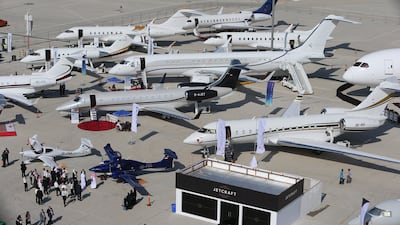The private jet industry can reduce emissions by purchasing carbon credits amid limited supplies of sustainable aviation fuel (SAFs), industry executives have suggested.
SAF, produced from sustainable feedstocks such as cooking oil and green hydrogen, is a key element of the aviation industry's goal of net-zero carbon emissions by 2050.
“A potential solution is to have a financial system like the renewable energy certificates for the electricity market,” Trine Braathen, senior manager, sustainability — carbon markets, World Kinect Energy, said during a panel session at the Middle East and North Africa Business Aviation Association (MEBAA) event.
“To claim the green value of the SAF, you need to buy the certification instead of actually having the physical delivery of the fuel.
“That’s how you will avoid the distribution challenges and it will be easier to scale.”
The International Air Transport Association (Iata) estimates that SAF could contribute about 65 per cent towards the reduction in emissions needed by the aviation industry to reach the 2050 target.
But this would require a huge increase in production to meet demand. The aviation body expects the largest acceleration of production in the 2030s as policy support becomes global, biofuels become competitive compared to fossil kerosene and credible offsets become fewer.
Currently, SAF meets less than 0.1 per cent of jet fuel demand as airlines seeking to use them face a supply crunch.
“The airlines are doing quite well and they are going to take a lot of the SAF, so the sooner we move, the better,” said Rolland Vincent, director of Jetnet iQ.
Last month, Hungary-based low-cost airline Wizz Air signed an initial agreement with Austrian energy company OMV for the supply of SAF between next year and 2030.
The deal allows Wizz Air to buy up to 185,000 tonnes of SAF from OMV.
Etihad Cargo also offers its partners and customers the option to transport cargo more sustainably through the SAF book-and-claim system as part of its sustainability push.
The Abu Dhabi flagship carrier’s cargo arm facilitated DSV Global Transport and Logistics’ SAF purchase last month, helping the transport and logistics provider to offset carbon emissions and reduce non-carbon climate effects. DSV became Etihad Cargo’s first partner to purchase sustainable aviation fuel to offset the carbon emissions of its shipments.
“Commercial airlines and the shipping sectors are also competing against each other for the supply of SAF, so it is very challenging,” said Ms Braathen.
Demand for private travel remained strong throughout the coronavirus pandemic as wealthy clients sought alternatives to commercial flights.
A record for global business jet demand was set in the first half of this year and although the rebound is slowing, the gains on 2019 have held steady at about 20 per cent, according to a report by data research and consulting company WingX Advance.
Although the pandemic hit the global economy, it did not slow down the growth of individual wealth, said Holger Ostheimer, managing director at DC Aviation Al Futtaim.
“The number of ultra-high-net-worth individuals or the concentration and growth of wealth is a major fuel factor of our line of business,” he said.
Dubai is the 23rd-most popular city in the world for ultra-wealthy residents, after the emirate recorded an 18 per cent increase in high-net-worth individuals (HNWIs) in the first six months of the year, a report in September found.
The city’s population of HNWIs rose to 67,900, up from 54,000 in June last year, according to a study by New World Wealth, a research company that tracks the wealth and movement of millionaires, multimillionaires and billionaires globally, and Henley & Partners, which tracks private wealth and investment migration trends worldwide.

